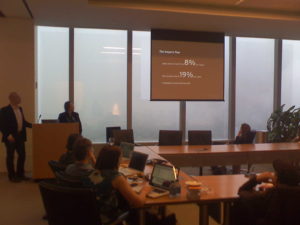
The Nutter administration will invest $100 million during the next four years in city technology, according to plans unveiled tonight by Philadelphia Chief Information Officer Allan Frank.
How they will is far less clear.
Frank unveiled his vision for a Digital Philadelphia Monday evening in front of a crowd of more than 75 members of the Refresh Philly design and developer community, as rain mist drifted past wall-length windows on the 45th floor of the Comcast Center.
The CIO hopes to employ a strategy that would procure federal broadband stimulus dollars to fund a longterm initiative overhauling the city’s technology infrastructure and its Phila.gov Web site.
“I basically want to blow the damn thing up,” he said to members as they clapped in support.
Frank said he’ll be open to input from the Philadelphia tech community leading up to a rough deadline to submit a proposal for federal stimulus dollars on August 15.
The city will hold large stakeholder meetings in June with city agencies, venture capitalists, education and health care institutions and business leaders in the Philadelphia technology community, he said.
Frank included few details but offered hypothetical scenarios of his vision, including a high tech enterprise zone, a government-underwritten broadband network to bridge the digital divide, and Web mashups that would give users access to city archives housing historic photographs, property records, and more.
Earlier, PhillyCHI chair Dave Cooksey and human-computer interaction PhD holder Kellie Rae Carter opened the session�focused on user experience and ways in which to improve Philadelphia�with a lecture detailing how governments have retooled vital services though complex design trials.
On three projector screens positioned in the room, Cooksy and Carter showed slides that detailed Philadelphia’s budget shortfalls, which Frank played off of later as gray skies cleared and lights dotted the North Philadelphia skyline.
“I look up North Broad Street and I see a textile industry that doesn’t exist anymore. I see the cycle of life. This is just how it happens,” he said, peering over glasses perched on the tip of his nose.
“When I look up there I think about Big Jobs. An opportunity to really think about building and fostering a new economy.”
Frank called the technology plan a “tremendous opportunity,” given current economic conditions, mayoral support and burgeoning technology community.
“What I’ve got is the best burning platform I could have,” he said, shaking both his fists emphatically.
Frank asked the crowed how to connect with citizens in the electronic age, sharing plans to continue embracing trending social media platforms like Twitter, and fielded questions from the largely digitally connected audience.
He deflected questions about city’s stance on open source technologies, Web site user experience testing and mobile device adoption.
“We need your help,” he told the crowd.
“Sign on with me for the Digital Philadelphia vision. You can define this.”
Staff writer Christopher Wink contributed to this report.







